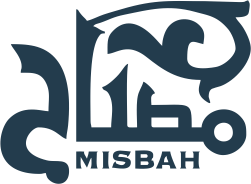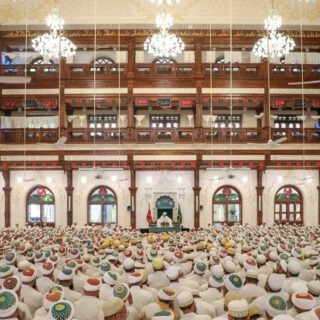12th ShehrAllah, 1441 H
In Surah Homaza, the word homaza (همزة) means to slander while lomaza (لمزة) means to tattle, backbite and ridicule. All of these acts are carried out by the tongue. Despite its size, the tongue holds the potential to make one commit the gravest of sins. This is one reason why the surah commences with the word ويل, meaning ‘perishment’. Amirul Mumineen AS states that the tongue is like a wild animal if set free it will bite.
The 2nd ayah of this surah speaks that such a person gathers wealth and assumes that it will remain forever. Syedna Mohammed Burhanuddin RA states, ‘if Allah has bestowed you with wealth, then spend. Eat properly. Some gather there wealth and are happy staring at it lying in their safe. If you spend, Allah will give you returns; spend upon yourselves as well, your children, your community and society at large.
The 3rd ayah states that ultimately such a person will be cast into hellfire. There are 7 names for hellfire in the Quran. The 4th ayah asks ‘what do you know of hellfire?’. This construction is found in many places in the Quran. It is used to bring out the importance or severity of a matter.
Today’s bayan focused on maintaining a balance in our diet as well as in all aspects of our lives. Maulana Imam Jafar us Sadiq AS states, ‘If people pursued balanced diets their bodies would become healthy and robust’. A question arises what is a balanced diet? Second, what is the perfect state for the body?
The Quran states, ‘we have created man in the most perfect form’. The perfect form means a form in which man can carry out all that he desires to do so. He can undertake all types of work. Ultimately, it is through this perfect form that man can ascend to the spiritual realm.
Each aspect of sharia is well-balanced, none of its directives are beyond the capacity of man. Adhering to its tenets allows us to lead a well-balanced life. The greatest threat to this balance is consuming an unbalanced diet. Excessive eating hinders one from carrying out the directives of sharia as they should be carried out. Though the flexibility of sharia offers alternative means for carrying out deeds, for example one can sit and pray namaz if he cannot stand up and do so, this still means that he was unable to do so in the preferred way.
Al-Dai al-Ajal Syedna Aali Qadr Mufaddal Saifuddin TUS repeatedly directs us that meals should be fakhir (sumptuous), he then elaborates that a sumptuous meal is one that is balanced, healthy and nutritious.
One aspect when consuming a meal is humility. Rasul Allah SA declined a drink containing both milk and honey mixed together while during his final ShehrAllah, Maulana Ali AS limited his iftaar to three luqmas and would consume barley wheat. However, during the time of Rasul Allah SA he would consume just as Rasul Allah SA would. His course of action defines for us that the meaning of humility is to align one’s acts and deeds with those of Maula. And abiding by his directives is the essence of humility and the way towards leading a balanced life.
All that which sharia has permitted, has made halal, is that which enables homeostasis. Illnesses are caused by an imbalance in this state. Imam Ahmed al-Mastur AS states, ‘the purpose of sharia is to preserve existing health and regain lost health’.
In Karbala, the adversaries went to extremes that were beyond the boundaries of humanity. Yet Imam Husain AS remained patient, calm and composed and carried out each act as required. According to the wishes of his respected brother, he solemnized a wedding. He came to aid of all those who called out to him, regardless of where they were and what beliefs they professed. He disseminated knowledge, counselled his Ahle Bait AS and Ashaab AS and finally underscored the notion that the key to attaining a balance in all aspects of life is by aligning one’s self to the wishes of the Almighty.








